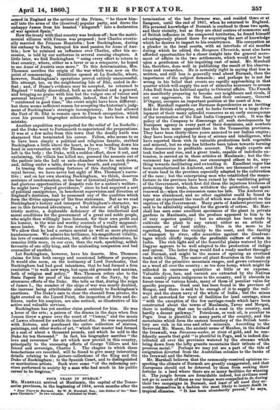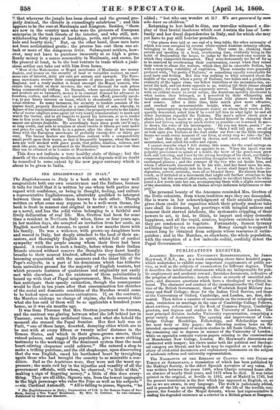FOITR YEARS IN BITRILLIE. *
Mn. Msaans.r.r. arrived at Maulmain, the capital of the Tenas- serim provinces, in the beginning of 1854, seven months after the
• Four Year. in Burmah. By W. H. Marshall, Esq., late Editor of the Ban- goon Chronicle." In two volumes. Published by Skeet. termination of the last Burmese war, and resided there or at Rangoon, until the end of 1857, when he returned to England. His personal knowledge of Burmah is confined to those two spots, and their vicinity, but as they are chief centres of commerce and of British influence in the conquered territories, he found himself advantageously placed there for acquiring the sort of knowledge which he desires to impart to his countrymen. His occupation ai a pleader in the local courts, with an interlude of six months during which he edited the Rangoon Chronicle, must also have afforded opportunities for a closer insight into the general move- ment of affairs in the two settlements, which would not be lost upon a gentleman of his inquiring cast of mind. Mr. Marshall has, therefore, done well in publishing the result of his observa- tions and researches. He is certainly right in saying that less is written, and still less is generally read about Burmah, than the importance of the subject demands ; and perhaps he is not far wrong in his belief that events are rapidly approaching in that quarter which will supply the sort of stimulus necessary to arouse John Bull from his habitual apathy to Oriental affairs. The French are manifestly preparing to become our neighbours and rivals, if not our aggressors, in the East, and their emissary, General D'Orgoni, occupies an important position at the court of Ava. Mr. Marshall regards our Burmese dependencies as an inviting field for British enterprise, and he looks forward to a large deve- lopment of their many splendid resources as an early consequence of the termination of the East India Company's rule. It was the policy of the Company to discourage all such developments by European agency in every part of their dominions, and nowhere has this been more apparent than in the Tenasserim provinces. They have been thirty-three years annexed to our Indian empire ; they have been explored by men of science and intelligence, who i
have reported them rich in valuable productions both vegetable and mineral, but no step has hitherto been taken towards turning these discoveries to profitable account. The staple exports are teak timber and rice, and a great trade, capable of indefinite ex- tension, is carried on in these articles at Maulmain ; but the Go- vernment has neither done, nor encouraged others to do, any- thing towards facilitating and extending it. Excellent sugar has been manufactured in Amherst, and there are thousands of acres of waste land in the province especially adapted to the cultivation. of the cane ; but the enterprising men who established the manu- facture in the province have been ruined by the vacillating policy of the Government, which first did them the injurious kindness of protecting their trade, then withdrew the protection, and again renewed it-when the concession came too late. The Amherst es- tate was abandoned, and no other capitalist could be found to repeat an experiment the result of which was so dependent on the caprices of the Government. Many parts of Amherst province are said to be edict' irably adapted for the growth of cotton. Mr. Mar- shall has seen some excellent specimens of the plant in private gardens in Maulmain, and the produce appeared to him to be of very superior quality ; but no attempt has been made to cultivate the plant to any extent either as an article of commerce or of local utility. This is the more to be regretted, because the vicinity to the coast, and the facility of transport by river, offer securities against the disadvan- tages which chiefly impede the profitable culture of cotton in India. The rich light soil of the beautiful plains watered by the Dagyne appears to be well adapted to the production of indigo and opium. The latter drug would find a ready market through- out Burmah, and might be the means of opening an overland trade with China. The castor-oil plant flourishes in the lands at the foot of the primitive mountain ranges, and grows extensively as a weed all over the country ; so too does hemp, which might be collected in enormous quantities at little or no expense. Valuable dyes, lacs, and varnish are extracted by the Natives from sundry plants indigenous to the country, and it abounds in forest-trees of various kinds, many of them of peculiar value for specific purposes. Good coal has been found in the province of Mergui, and there is said to be enough of it to supply the rail- ways and the steam navy of the whole of India ; but the mines are left unworked for want of facilities for land carriage, since " with the exception of the few carriage-roads which have been
constructed about the towns of Maulmain, Tavoy and Mergui, there is nothing that can be called a road in the country, and hardly a decent pathway." Petroleum, or rock oil, is peculiar to Pegu. Iron is plentiful in many parts of the country, and the mountains which form the eastern boundary of the British terri- tory are rich in tin ores and other minerals. According to the Reverend Mr. Mason, the ancient name of Maubee, in the deltaof the Irrawadi, was Suvanna-nadee, or river of gold, and he con- fidently asserts that gold "is plentiful in Pegu, and is indeed dis- tributed all over the provinces watered by the streams which bring down from the lofty granite mountains their tribute of the precious metal." Perhaps we may yet see a part of the tide of emigration diverted from the Australian colonies to the banks of the Irrawadi and the Salween.
Mr. Marshall believes that the commonly-reoeived opinions re-
specting the climate of Burmah are greatly exaggerated, and that Europeans should not be deterred by them from seeking. their fortune in a land where there are so many facilities for winning it. The jungle fevers are formidable indeed, but civilians need not go in search of them as our troops were compelled to do during their two campaigns in Burmah, and least of all need they ac- coutre themselves in a fashion the most likely to insure death in
he says, tropical climates. " It has been abundantly proved," " that wherever the jungle has been cleared and the ground pro- perly drained, the climate is exceedingly salubrious " ; and this appears to be the ease at Maulmain and Rangoon. Besides, " there are now in the country men who were the pioneers of European enterprise in the teak forests of the interior, and who still, not- withstanding forty years of hardships, perils, and privations, are hale and hearty men." But, on the other hand, these men have not been acclimatized gratis ; the process has coat them one at- tack or more of the dangerous fever. Subsequent settlers, how- ever, may not have to purchase immunity at so high a price. Ready money is a scarce commodity in Maulmain, and seems, for the present at least, to be the beat venture in trade which a judi- cious settler can take out with him from home.
" Most of the Mahomedan or Mogul merchants of Maulmain are money dealers, and money on the security of land or valuables realizes an enor- mous rate of interest, sixty per cent per annum and upwards. The Euro- pean merchants receive their consignments of piece goods per ship from England, and a ready market is found amongst the Mogul usurers, who obtain long credit on their invoices, the rate of discount for cash prices being comparatively trifling. In Burmah, where speculations in timber and produce are so extensive, money is in constant demand for advances to foresters, coolies, and others ; and speculators can afford, generally speak- ing, to pay heavy interest on loans, which is abundantly covered by the usual returns. In many instances, the security to lenders consists of the timber itself, properly described in a conditional bill of sale, whereby, in failure of due repayment at a stipulated time, the property reverts to the lender who of course employs some agent (at very scanty remuneration) to mark and watch the timber, and in all respects to guard his interests, so as to render his to him next to impossible. Thus it is that large sums in hand to the *surer are always desirable. He accordingly buys piece goods (we'll say), at long. credit, and sells to retailers at about twelve or fifteen per cent under cost price for cash, by which he is a gainer, after the close of his transac- tions with the European merchants of probably twenty-five or thirty per cent. The bazaar dealers are themselves content with a comparatively small profit upon their wares, so that it frequently happens, when the mar- kets are well stocked with piece goods, that prints, muffins, calicoes, and such like gear, may be purchased in the Maulmain bazaar at less cost than they can be obtained at in London or Manchester."
This does not indicate a very healthy state of things ; but the dearth of the circulating medium on which it depends will no doubt he remedied to some extent by the new paper currency which is about to be given to India.



























 Previous page
Previous page